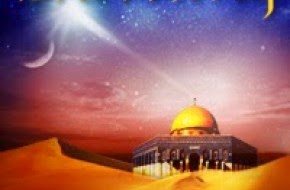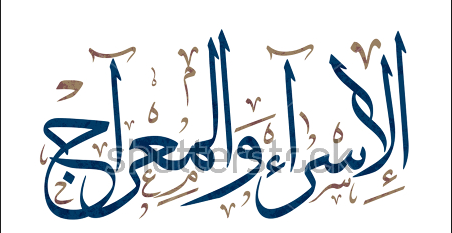
Sayyid `Ali Muhammad Shirazi (1819-1850),
The Bab
Sharḥ kayfiyyat al-mi`rāj
or
THE RISĀLA FĪ JASAD AL-NABĪ,
A TREATISE IN REPLY TO A QUESTION ABOUT THE [TRANSLOCATION OF THE] BODY OF THE PROPHET MUHAMMAD.
Introductory Note and Mss.
Stephen Lambden
1990s then 2006-7 and now under revision
IN PROGRESS
Last updated 25-03-2018

The Isra' (Night Ascent) and the Mi`raj (Night Journey).
ZAMAKSHARI ON QUR'AN 17:1
H. Gätje, [Tr. A. Welch] The Qur'ān and its Exegesis, 74-7.
4. The night journey and the ascension Zamakhsharĩ on Sūra 17:1
Glory be to Him who carried His servant by night from the holy mosque to the farthest mosque14 the precincts of which We have blessed, that We might show him some of Our signs. He 15 is the One who hears, the One who sees. [75] ... Who carried (asra 16) His servant by night (lailan) : ...
One· may ask : Since the (word) asrā in itself already means 'to undertake a night journey', then what does the stipulation 'by night' add to the meaning of the statement? To this I reply: With the expression 'by night' 17 ... God wishes to indicate the duration of the night journey as short, saying that within a (single) night he and his servant accomplished the journey from Mecca to the Syrian lands (ash-sham 18} which (usually) required forty nights. ...
There is disagreement regarding the place from which the night journey originated. Some say that it was the holy mosque (of Mecca) (al-masjid19 al-harām) itself. This is likely since it is mentioned in the following account from the Prophet : While I was between being asleep and awake in the apartments near the Ka'ba (al-bait) at the holy mosque, Gabriel came to me with the (steed) Burãq.20 Others say (however) that the journey of Muhammad originated from the dwelling of (his cousin) Umm Hani', the daughter of Abū Ṭālib. In this case the expression 'holy mosque' would indicate the holy precinct (of Mecca) (al-haram), since this area includes the mosque and can thus be referred to by this designation. According to Ibn 'Abbas the entire sacred precinct is a mosque.
(Furthermore) the following is related : After the evening prayer Muhammad slept in the dwelling of Umm Hāni , when he was taken on the night journey (to Jerusalem) and returned in the same night. Afterwards he related the story to Umm Hāni , saying: 'The prophets have appeared to me and I have performed the prayer with them.' As he now rose to go to the mosque, Umm Hāni clung to his robe, and he said : 'What do you want?' She answered : 'I fear that your fellow tribesmen will accuse you of falsehood if you relate that to them.' To this he replied : 'What, would they accuse me of lying?', and he went away. Then when Abu Jahl sat down next to him and the Messenger of God related the story of the night journey to him, Abu Jahl called out: 'Men of the (tribe of) Banu Ka'b ibn Lu'ayy, come here !' Then Muhammad related the account to them. While some gave their approval to him, others placed their hands on their heads with astonishment and disapproval. Some people who had believed in the Prophet previously now turned away from him. Some men, however, ran to Abu Bakr, who (after hearing their account) said: 'If Muhammad said this then it is the truth.' When the men then asked: 'Do you then believe (saddaqa) that he did this?', he answered: 'I believe him in matters even more [76] unlikely than this.' For this reason Abu Bakr is called 'the eminently veracious' (as-siddĩq).
Among those present, however, were some who had previously travelled to that place and they challenged Muhammad to give a description of it. Jerusalem (bait al-muqaddas) stood clearly before his eyes, so he looked over it immediately and began to describe it to them. They said: 'The description is accurate', and then they added: 'Tell us about our caravans (which are returning from Jerusalem)!' So he told them the number of their camels and their condition and then said : 'They will arrive at sunrise on such and such a day, with a grey camel leading them.' On that day the Meccans went (out from their city) and ran quickly to (the passageway) ath-Thaniyya. Then one of them said: 'By God, the sun is just coming up!' And another said: 'By God, here comes the caravan with a grey camel at the head, just as Muhammad said.' (In spite of this) they did not believe (Muhammad's account of his night journey to Jerusalem), but said : 'This is nothing but manifest magic (sihr mubīn)՝
In the same night (in which the journey to Jerusalem occurred) Muhammad was (also) raised up to heaven; that is, the ascension 21 took its departure from Jerusalem. Muhammad told the (members of the tribe) Quraish also of the wonderful things which he had seen in heaven, that he met the prophets there and went as far as the house visited (by the pilgrims) (al-bait al-ma'mūr 22) and the Zizyphus tree at the far end of heaven (sidrat al-muntahã 23).
There is (also) disagreement concerning the date of the night journey. While some say that it occurred one year before the emigration (to Medina), according to Anas (ibn Mālik) and al-Ḥasan (al-Baṣrī) it took place (even) before the mission (of Muhammad as a prophet). (Furthermore) there is disagreement concerning whether the night journey occurred (while Muhammad was) in the state of being awake or asleep. The following is (related) from 'Ā'isha: 'By God, the body of the Messenger of God was not missed (during the night journey); rather, the ascension to heaven occurred with his spirit (rūḥ).՝ According to Mu'awiya (also) it took place only with the spirit. On the other hand, according to al-Ḥasan (al-Başri) it was a vision which Muhammad had in his sleep; yet most Traditions stand in opposition to this contention.
The farthest mosque: 2* Jerusalem. At that time no mosque existed farther away (from Mecca) than the one at Jerusalem. [77] The precincts of which We have blessed: God means the blessing of religion and of the present world, for Jerusalem had been since the time of Moses the place of worship of the prophets and the place to which (divine) inspiration was restricted (before the time of Muhammad), and it is surrounded with flowing rivers and fruit-bearing trees. ...
He is the One who hears the speech of Muhammad, the One who sees his deeds and the one who knows of his purity and uprightness. ...
♦

The Risāla fī'l-jasad al-nabī
(Treatise upon the [translocation] of the body of the Prophet [Muḥammad]) of the Bab
Also known as the Sharḥ kayfiyyat al-mi`rāj (Commentary upon the modality of the mi`rāj [of the Prophet Muḥammad]), the Risāla fī'l-jasad al-nabī (Treatise upon the [translocation] of the body of the Prophet [Muḥammad]) may have been written for a certain Mīrzā Ḥasan Nūrī. The work is about the universal translocation of the jasad (the cosmic "body") of the prophet Muhammad (d. 632 CE) at the time of his night journey and/or ascent", mi`rāj (lit. ladder) as this phrase is often translated. The initial recension of this short Arabic treatise of the Bāb appears to have been composed in the context of a public gathering such as took place in the house of the Imam Jum`ih of Iṣfahān around Sept./Oct. 1846.
There exist at least six mss. of this work: (1+2) INBA 6016C: 388-390 = INBMC 14:390-2) [translated here], (3) INBMC 40:197-8, (4) INBMC 53: 404-404, (5) INBMC 69 : 416-8, (6) Cambridge, Browne mss. F.21 item 14.
This text begins :
In the Name of God, the Merciful, the Compassionate.
[1]
Praise be to God Who hath manifested Himself (tajallī) within and through existing realities by virtue of the theophany (bi-ẓuhūr) of His Divine Will (al-mashiyyat). [2] This to the end that He might inform all levels of contingent reality (mumkināt) that God made the realities (ḥaqā'iq) of the essences (dhātiyyāt) of their various beings (kaynūniyyāt) through modes of the Divine Activity (maqāmāt al-fi`al) and manifestations of passive receptivity (ẓuhūrāt al-infi`āl). [3] This until all were befittingly instructed about the station (maqām) of His Logos-Self (nafs) and initiated into His wisdom (ḥikma) respecting its genesis (mabda') as accords with what God decreed for it on every level. [4] This such that it might be realized that there is no finality (nihāya) [for the Logos-Self] either before it, through it or towards it. [5] On the level of contingent existence (al-imkān) He doth testify unto what God Himself, by virtue of His Own Logos-Self, doth testify as also do His creatures (who ever declare that) `There is no God except Him, the Mighty, the Transcendent.
It concludes :
[VII]
[1] And if God so willed and desired He could assuredly have expounded the reality of this enquiry about the secret of the concreteness of the event [of the translocation of the Body of the Prophet] (bi-sirr al-wāqi`ī ) and the decree regarding its realization (ḥukm al-bāligh) relative to his particular station (maqāmihi). [2] This in that He is fully aware of the wisdom (ḥukm) of [the actualization of] this matter (al-amr) [which is "betwixt two matters"] through the (two) levels of the divine Theophany (fī maqāmāt al-ẓuhūr). [3] And He is not veiled on account of the dawning forth of the Light of the Unseen Realities (nūr al-ghuyūb) in view of his being held back [veiled] from the court of proximity to the Divine Presences (sāḥat qurb al-ḥuḍūr). [4] And respecting that station (maqām) the Pen engulfed two flowing rivulets [of water to express these mysteries] yet the decree affirming the exposition (ḥukm al-bayān) was returned unto God relative to (both) its going forth (mabda`) and coming back (al-iyāb).
[5] And praised be unto God, the Lord of the heavenly Throne above, One beyond what the negligent assert. And peace be upon the Messengers and praised be God the Lord of all the worlds.



